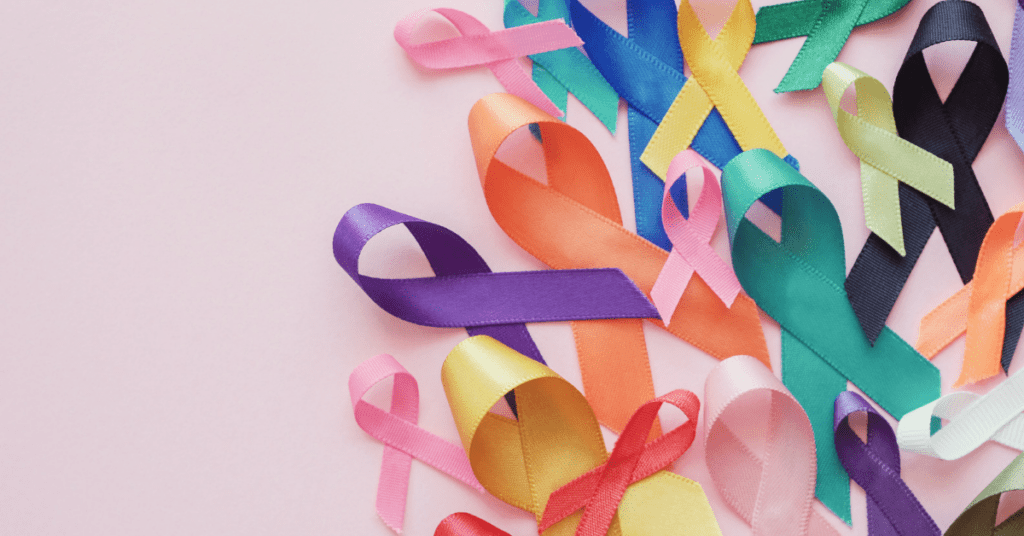Are you wondering how to support a family member with cancer? At Aynjil, we understand that a cancer diagnosis, whether it be a family member’s or friend’s, is devastating and has a big impact on mental health and decision making.
Showing support and encouragement to friends and family members with cancer can go a long way to help improve their overall mental state and well-being. Here’s how to support a loved one with cancer:
Prepare Yourself First
Before you can support and care for a loved one dealing with cancer, you need to mentally and emotionally prepare yourself for the journey ahead. Physical changes resulting from the illness or treatment, like hair loss, extreme weight loss or weight gain, loss of colour, and even disfigurement from medical procedures, can be difficult to witness. Not to mention, caring for a loved one who is dependent on you can also affect your mental health.
Quote: ‘When someone you care about has cancer, it is normal to experience many different feelings. Get tips and support to help you cope with these feelings’ – Macmillan Cancer Support.
Here’s what we recommend for anyone who wants to know how to support a family member with cancer:
How to Prepare Yourself for Supporting a Loved One With Cancer
Process How You Feel About the Cancer Diagnosis First
Be extra kind to yourself, especially if you’re struggling with guilt and need some time to process how you are feeling. It is a perfectly natural reaction to want to distance yourself from your loved one after a cancer diagnosis because it forces us to face uncomfortable topics and fears surrounding our mortality. However, it’s important not to let these feelings overwhelm you.
Emotional help and mental health support like counselling or psychotherapy can help you set important boundaries, giving you the tools to help your loved ones cope with their feelings and manage the stress that comes with a cancer diagnosis.
Understand the Cancer Diagnosis and Treatment Options
Knowledge is power! Take the time to research and understand the types of cancer, the available treatment options, and find out how to support a family member with cancer through various stages of the disease.
This information will help you assist your relative or friend in making an informed decision, or it can help you better understand their wishes and choices.
Change Your Perspective
A cancer diagnosis does affect you, but you also need to remember that you are only there to offer support and care – if asked.
Don’t distract yourself with all the ways of how to support a family member with cancer,’ and forget their boundaries.
Boundaries are important, especially when it comes to personal space and offering unsolicited advice, opinions, information, or even sharing ‘inspiring comparison’ stories. These can place unnecessary extra pressure on a person dealing with cancer instead of giving them time and space to heal.
What to Say to Someone Who Has Just Been Diagnosed With Cancer?
Being honest with a family member who has recently been diagnosed with cancer is always the best course of action when considering how to support a family member with cancer. It’s okay to say ‘I don’t know what to say’ in an emotional situation, like a cancer diagnosis.
Here are some ideas of what you could say to show your care and support to a loved one with cancer:
- I’m not sure what to say, but I want you to know I care.
- I’m sorry this has happened to you.
- I’m sorry to hear that you are going through this.
- If you ever feel like talking, I’m here.
- Please let me know how I can help you (and your family).
- You are in my thoughts.
- I am here if you need me.
- How are you feeling right now?
- I want to be there for you. How can I help?
- I love you.
What Should You Not Say to Someone With Cancer?
During extremely emotional events, like a cancer diagnosis, you need to conscious of your expectations of the person with cancer and how you communicate with them.
When thinking about supporting a family member with cancer, something that may seem helpful or caring to you may be unhelpful or even upsetting to someone facing cancer.
Here are some ideas of phrases that you should avoid:
- I know just how you feel
- I know what you should do
- It’s because of ‘X’, ‘Y’ and ‘Z’
- I’m sure you’ll be fine
- Don’t worry
- You’ll get over it
- How long have you got?
- You’ll beat this, I just know it
- It’s not so bad
- Don’t be so negative
- Cheer up
- I recommend ‘X treatments/doctors/hospitals’ (unless asked)
- You just need to be healthier
- All you need is exercise and good nutrition to beat this
How Do You Cheer up Someone With Cancer?
Cancer takes a huge toll on the human body, self-esteem and mental health, often leading to a fear of being treated or viewed differently. So, the best way to cheer up a relative or friend with cancer is to treat them as normal.
Continue to invite them out, include them in outdoor activities, or invite them to try new things. Activities, exercise and social events are a great way to produce endorphin naturally and improve a patient’s mood and outlook. It will also help them feel less isolated.
How Do You Help a Cancer Patient Emotionally?
A great way to help a cancer patient emotionally is to be a friend, be there to listen to them, and be patient with yourself and them.
There isn’t an exact answer to the question of how to support a family member with cancer. Everyone processes emotions differently, and it’s normal for someone living with cancer and someone undergoing cancer treatments to grieve. Daily, or even hourly, mood changes and heightened emotions are normal responses for someone processing a cancer diagnosis.
Cancer affects the mental health of those diagnosed, as well as their loved ones. Both cancer patients and those close to them can experience the following emotions:
- Anger
- Anxiety
- Depression
- A feeling of loss of control
- Fear
- Frustration
- Resentment
- Grief
- Guilt
- Heightened emotions
- Hopelessness
- Isolation
- Loneliness
- Mood swings
- Sadness
- Sleeplessness
- Uncertainty
If your loved one with cancer needs help processing the stress cancer brings, we recommend you urge them to seek professional help and seek out free cancer support groups on social media, like the CANSA Survivors – Champions of Hope Support Group on Facebook.
Supporting People With Cancer?
1. How Can I Assist My Friend With Their Cancer Diagnosis?
A recommended way to assist a friend after a cancer diagnosis is to help them with practical everyday things they may not have the strength or emotional capacity to do.
Remember to always check-in first and respect the wishes of those coping with their diagnosis. Here are some examples of practical things you can offer a friend in need:
- Offer to make meals to keep in the freezer
- Transport to and from chemotherapy or radiation treatments, and hospital visits
- Assist with laundry
- Care for pets, or help with vet visits
- Help with shopping
- Take children to school or babysit
- Offer to visit and take lunch with you
- Help with small errands
If a friend or family member refuses your help, don’t take it personally. Some people find it hard to accept assistance or find a sense of independence in doing everyday things.
2. How Can I Support a Family Member With Cancer?
Relatives with cancer might find it difficult to reach out for help because they don’t want to seem vulnerable or weak to their loved ones.
Families can also add extra pressure to the situation with phrases like ‘you’re so strong’, ‘you’re a fighter’ or ‘you’re brave’ as they place subtle expectations on the person to behave a certain way or act strong. Instead, be a safe, calm place for your loved one, where their comfort is your main concern.
Here are some ideas of things you can do for your relatives with cancer:
- Manage family updates and news
- Assist with scheduling visits and appointments
- Help with post-surgery physiotherapy exercises
- Medication scheduling
- Wound dressing
- Assistance with budgeting/finances
- Journaling
- Bathing
- Household chores
3. How Can I Help My Spouse With Cancer Diagnosis?
You need to show yourself and your spouse a lot of love and patience. Hair loss and physical changes can lead to a distorted self-image, which means your loved one may need to hear “I love you” a little more. Your loved one may also need to lean on you a lot more for emotional support and advice, or they may need you to take on extra household tasks.
If the stress is too much, just be honest. Help is available for those who act as carers in the form of therapy, counselling and online resources.
Depending on the stage of cancer, you may need to assist your spouse with the following:
- Creating and finalising a will.
- Assistance with decisions regarding internment and funeral preparations.
- Treatments decisions.
- Writing letters to family members and friends.
- Setting up life insurance beneficiaries.
- Creating a list of debts, assets and accounts.
- Drafting an obituary
10 Ways You Can Assist People With Cancer
1) Provide transport to appointments
2) Help with meals – meal preparations, meal planning, etc.
3) Create shopping lists and do grocery shopping
4) Offer to babysit, or provide child care
5) Schedule and co-ordinate visits with loved one’s
6) Assist with prescribed medication schedules
7) Help run errands and do admin – paying bills, going to the pharmacy, making phone calls, etc.
8) Assist with phone calls and messages when the person with cancer needs rest
9) Keep loved one’s updated regarding news, treatments and schedules
10) Be there and listen, without judgment.
Activities for Cancer Patients
Different types of cancers and treatments affect the patient’s very differently. Some struggle with fatigue, weakness and appetite loss, while others have the strength to continue to work through their treatment, and even start new hobbies. With this in mind, there are many things you can do to cheer up a family member or friend with cancer. Remember to be realistic about their current abilities and/or limitations.
Here are some simple activities cancer patients can try:
- Start a good book or join a book club
- Art and crafts, such as scrapbooking, knitting, drawing and painting.
- Blogging, vlogging or journaling
- Gardening
- Walking or jogging
- Yoga or Pilates
- Dancing
- Cooking/Baking
- Swimming
- Short term goal setting, such as planning a family meal, or finishing a 5km walk.
- Creative writing and poetry
- Card games, board games or Chess
- Listening to or playing music
How to Support Someone When Cancer Returns?
- The Emotional Impact of Cancer Returning
Sometimes cancer recurs in patients and treatment needs to begin again. After being in remission, a patient receiving news of cancer may not react the way they did previously to a diagnosis. Some people may feel too emotionally and physically drained to undergo treatment and fight the disease again. At the same time, others may accept the recurrence and continue with everything needed to fight it. Communicate openly and honestly with your family member to find out how they feel and what their wishes are.
- The Quality of Life Discussion
The ‘quality of life’ discussion is one no one wants to have, but it is important to be able to speak to your loved ones about their plans; if they enter the late stages of cancer; if they wish to no longer pursue treatment due to age, or they wish to stop treatment because of the physical side effects.
It is important to remember it is their decision and their right to refuse treatment. As their loved ones, we can only respect them and love them.
- Financial Effects of Cancer Treatments
Finances may be a reason your family member may not want to continue with treatment. Cancer affects not only your health but also your finances.
Some lose their income due to absenteeism at work because they feel unwell during and after treatments. While others get into debt paying co-payments for medication, blood tests, doctors visits and treatments.
If your loved one has a cancer policy, we recommend contacting their insurer to help cover any cancer-related costs not covered by their health insurance.
How Do You Comfort Someone Who Is Dying of Cancer?
The late stages of cancer or terminal cancer can be challenging for patients and loved ones. There can be extreme physical changes, loss of mobility, memory and even muscle memory.
To comfort someone who is dying of cancer, we recommend a lot of patience and allow them to enjoy small pleasures (like having an ice cream after dinner or having a bubble bath). Keep them comfortable, hold their hand if they need a loving physical touch, and allow for moments of silence.
Think you may be at risk? According to studies, 5 – 10% of all cancers are hereditary. We recommend you investigate cancer insurance with Aynjil to find out how our benefits can help you and your family cope with cancer costs.



